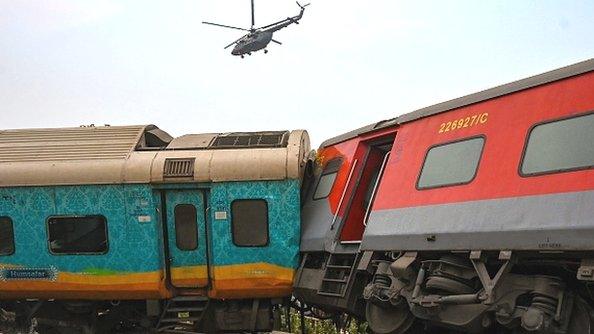India train accident: Modi vows punishments over deadly Odisha crash
- Published
The BBC's Archana Shukla in Cuttack: ''Distress and chaos'' at the hospital treating the train crash injured
People found guilty over a deadly rail accident in eastern India will be "punished stringently", the country's Prime Minister Narendra Modi has said.
At least 288 people were killed and more than 800 injured in Friday's incident in Odisha state, involving two passenger trains and a goods train.
Rescue efforts have concluded, with officials saying all trapped and injured passengers have been retrieved.
Mr Modi has visited the scene, labelling the incident a "painful" one.
He also met victims of the disaster in hospital, and vowed that his government would leave "no stone unturned for the treatment of those injured".
It is still not clear what caused the multi-train collision in Balasore district, which has been described as India's worst rail accident this century.
A full investigation has been launched, but a preliminary report indicates that the accident was the result of signal failure, said KS Anand, chief public relations officer of the South Eastern Railway.
Some 2,000 passengers are thought to have been on board the two passenger trains involved.
The exact sequence of events has been the subject of conflicting accounts.
Officials say several carriages from the Coromandel Express, travelling between Kolkata (formerly Calcutta) and Chennai (formerly Madras), derailed at about 19:00 (13:30 GMT) after hitting a stationary goods train. It remains unclear how the Express ended up on the same track as the goods train.
Several of the Coromandel Express's coaches then ended up on the opposite track. Another train travelling in the opposite direction - the Howrah Superfast Express travelling from Yesvantpur to Howrah - collided with derailed carriages.
"The Coromandel Express was supposed to travel on the main line, but a signal was given for the loop line instead, and the train rammed into a goods train already parked over there," Mr Anand said.
"Its coaches then fell on to the tracks on either side, also derailing the Howrah Superfast Express," he said.
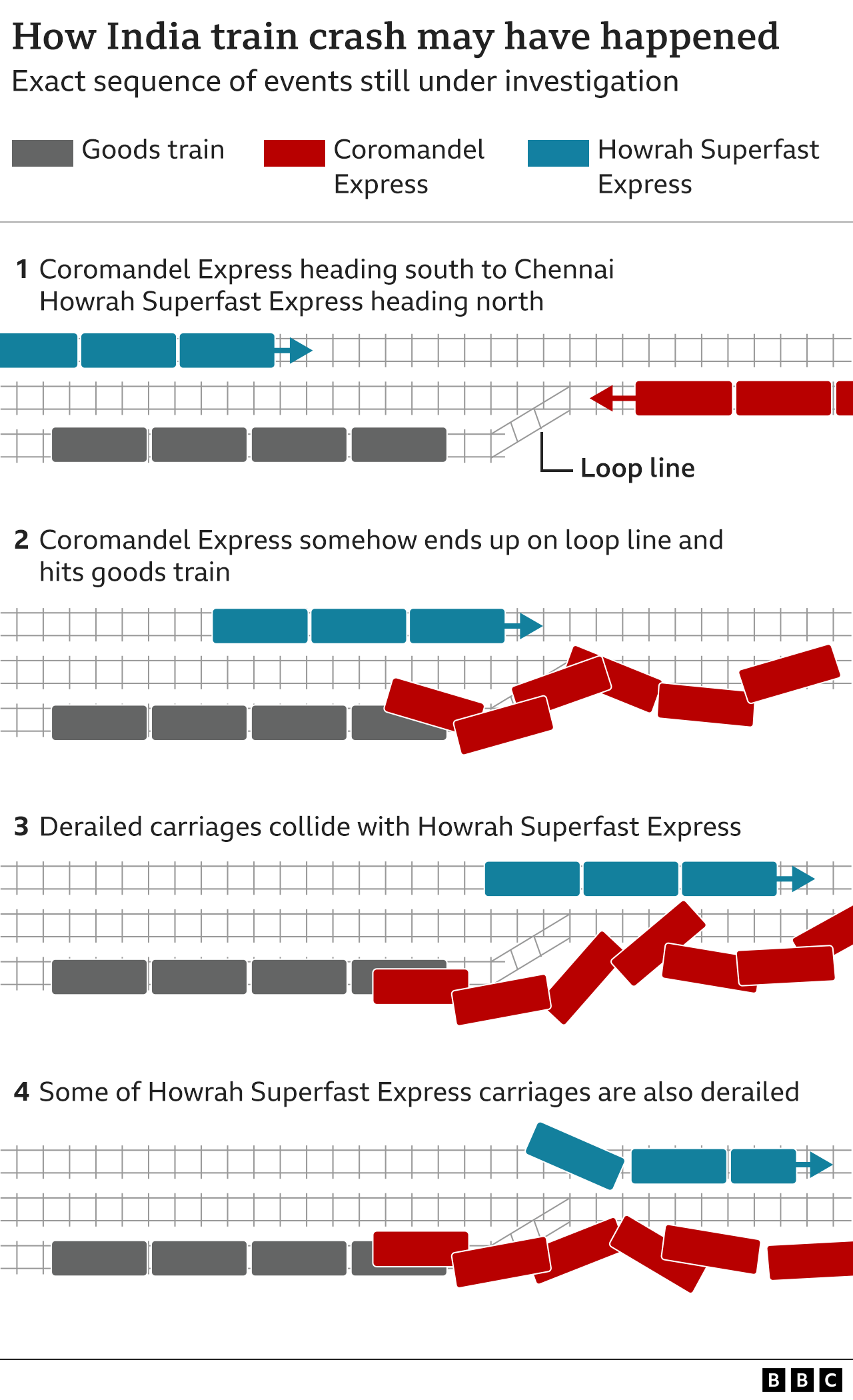

Sounds of ambulance sirens have been going off every 30 minutes outside the trauma centre in the SCB hospital in the city of Cuttack - where critically injured passengers have been wheeled in.
So far, close to 200 passengers from the train accident site have been brought in, and the numbers continue to rise.
The hospital is the largest in the state of Odisha, but is still three hours' drive from the accident site.
The hospital staff - from junior doctors to nurses and ward boys - have been lined up and waiting in groups to assist patients as they are brought in. Wards have been expanded to handle the numbers coming in.
The constant sounds of whistles and announcements by hospital authorities interrupt the chaos.
Family members of the injured are waiting anxiously outside praying for their relatives' wellbeing. But many are still looking for their loved ones, not knowing their whereabouts.
There is a counter set up to assist people who cannot locate their family members. It is crowded, and the lists run long.
Some people met by the BBC ran from the accident site to nearby hospitals before coming to the facility in Cuttack - searching for their families who were on board the trains.
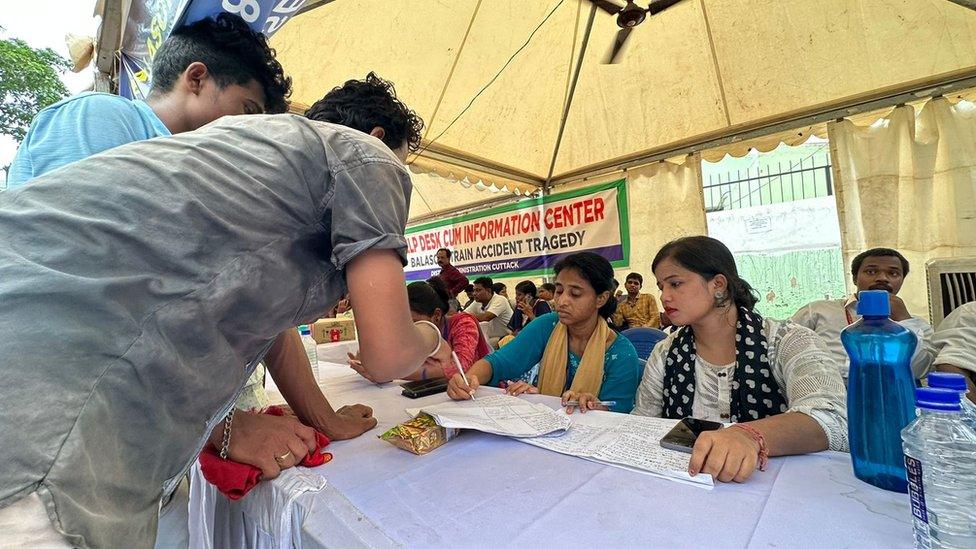
People check a list at a hospital in Cuttack to see if their relatives have been taken there

India's deadly train crashes
June 1981: About 800 people die when seven of the nine coaches of an overcrowded train fall into a river during a cyclone
August 1995: At least 350 people are killed when two trains collide 200km (125 miles) from Delhi
August 1999: Two trains collide near Kolkata killing at least 285 people
October 2005: 77 people are killed when a train derails in the southern state of Andhra Pradesh
November 2016: Nearly 150 people are killed and an equal number are injured when 14 carriages of the Indore-Patna Express train derail near the city of Kanpur

Announcing the conclusion of rescue efforts on Saturday, the railway ministry said work to restore the crash site had begun.
Survivors and eyewitnesses earlier described chaotic scenes and the heroic efforts of people from nearby villages to save trapped passengers.
Mukesh Pandit, who was trapped for half an hour before being rescued, told the BBC he heard a "thunderous sound" shortly before the carriage overturned.
"Four passengers who were travelling from my village have survived, but a lot of people are injured or still missing. A lot of people died in the coach I was travelling in," he added.
Residents of the neighbouring villages were among the first to reach the site of the accident and start the rescue operation.
Watch: ‘I heard a loud sound and the train overturned’
India has one of the largest train networks in the world with millions of passengers using it daily, but a lot of the railway infrastructure needs improving.
Trains can get very packed at this time of year, with a growing number of people travelling during school holidays.
Both passenger trains involved in the crash were full and had many more people on the waiting list, according to passenger lists on the Indian rail ministry website reviewed by the BBC.
India's worst train disaster was in 1981, when an overcrowded passenger train was blown off the tracks and into a river during a cyclone in Bihar state, killing about 800 people.
Additional reporting by Aakriti Thapar.

Are you in the area? Did you witness the incident? Email haveyoursay@bbc.co.uk, external.
Please include a contact number if you are willing to speak to a BBC journalist. You can also get in touch in the following ways:
WhatsApp: +44 7756 165803
Tweet: @BBC_HaveYourSay, external
Please read our terms & conditions and privacy policy
If you are reading this page and can't see the form you will need to visit the mobile version of the BBC website to submit your question or comment or you can email us at HaveYourSay@bbc.co.uk, external. Please include your name, age and location with any submission.
- Published3 June 2023
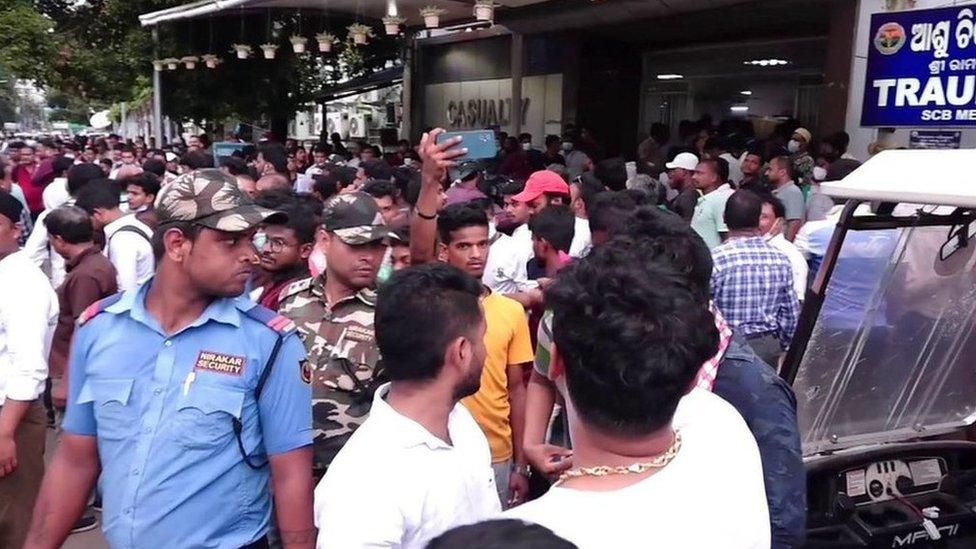
- Published3 June 2023
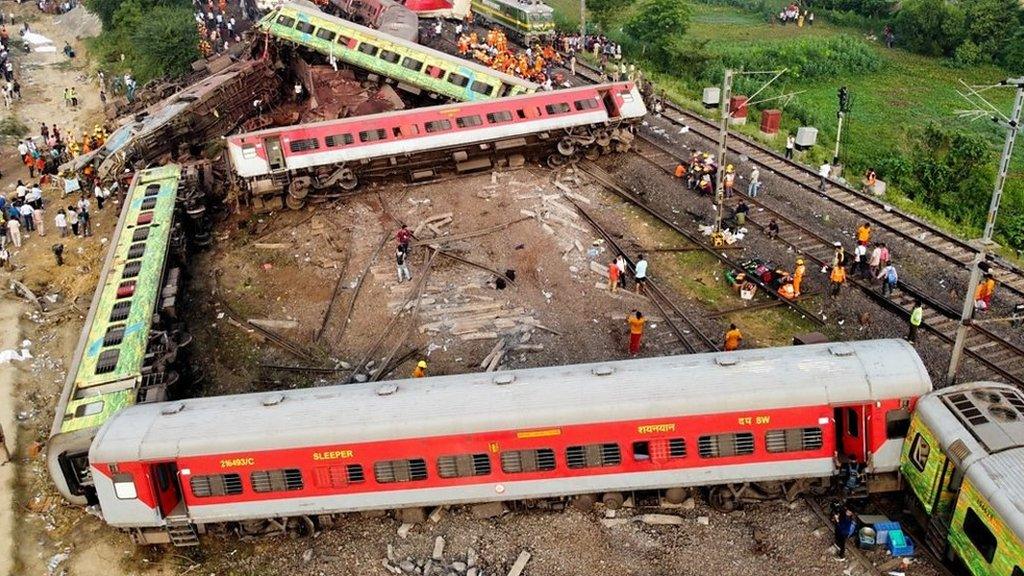
- Published3 June 2023
